JK1SXR
Snapshot 60 No.600-609
609. A kamakiri
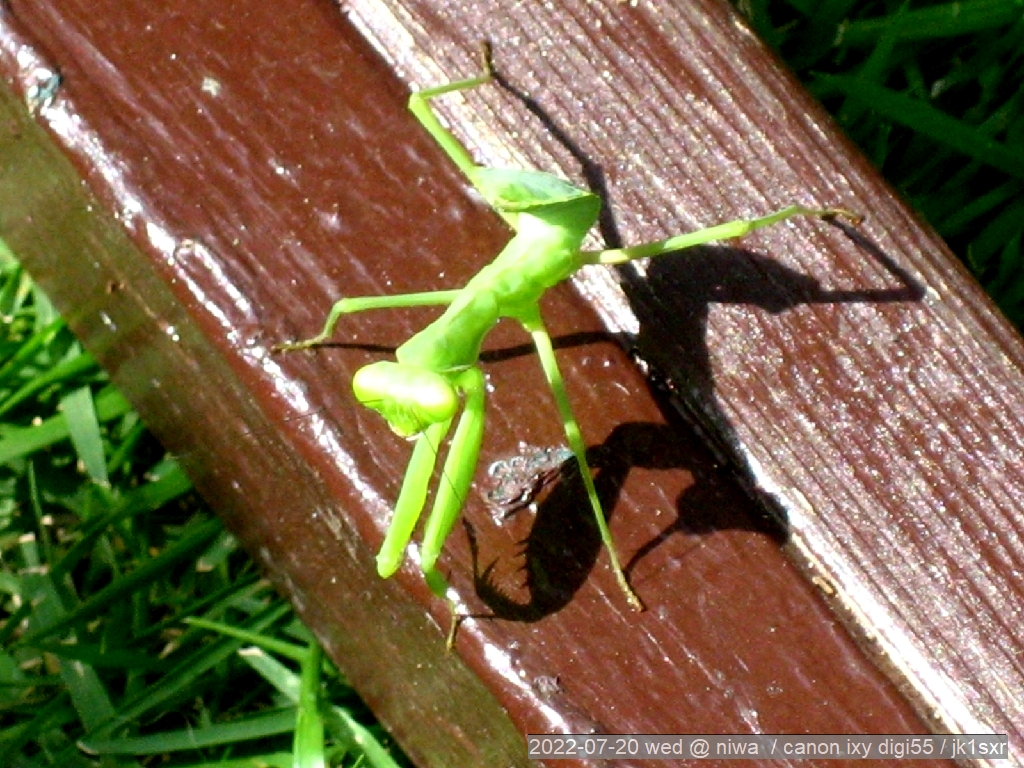 When I work at my yard, this babe frequently appears. Looks it comes to closer, when it senses something moving.
When I work at my yard, this babe frequently appears. Looks it comes to closer, when it senses something moving.
Its length was about 1 cm a month ago. Now, 3 cm. Hope it continues to reside here until autumn.
608. Inborn stealth
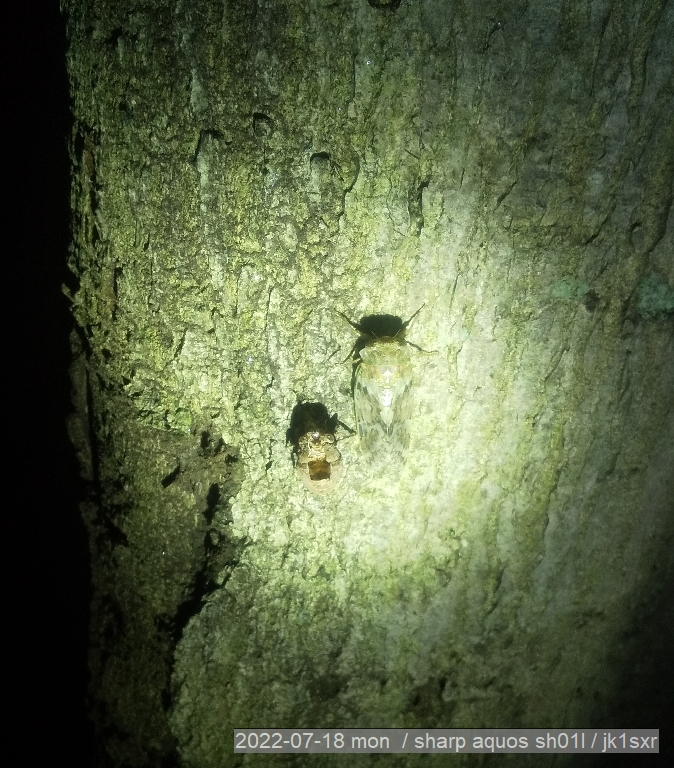 Happened to encounter a nii-nii zemi just emerged from the larva. At a nearby square.
Happened to encounter a nii-nii zemi just emerged from the larva. At a nearby square.
Used a hand light for this shot, as a close range flash could be a harm to its eyes.
As always, it devotes itself to the stealth coloring.
Looks the rain period has returned again. As usual, it will not end untill 1 or 2 weeks after hearing the chirps of this insect.
607. "Patman X" #
 An article of today's Yomiuri News local page about electric bicycles.
An article of today's Yomiuri News local page about electric bicycles.
Reporting the sales of imported bicycles adjusted to local regulations.
This tire design, small diameter and wide width. Looks familiar?!
Yes, "Patman X"'s bicycle, made to resemble a motorcycle.
Well, those who know this are now all in the elderly category?
My experience of a mountain-bike for a daily use has indicated that the tires of small diameter and wide width bring about the light start and flexibiltiy to road bumps, and indeed go well with city riding.
"Patman X" #: A manga series by George Akiyama
606. Nii-nii
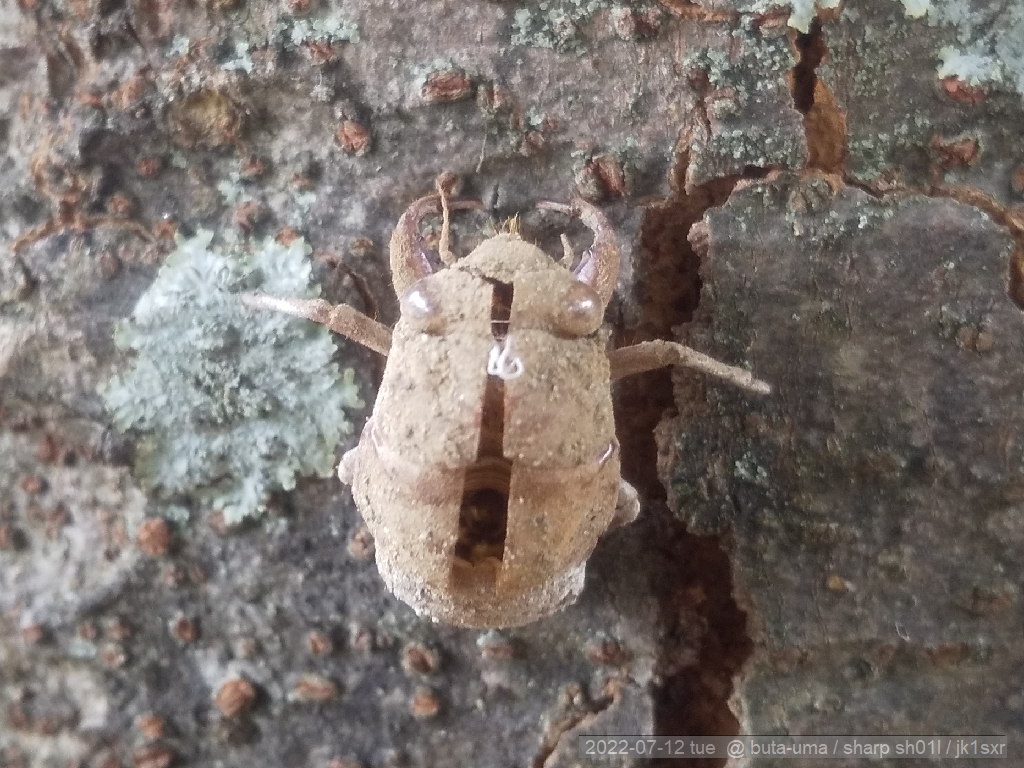 This year's tuyu rain period ended without hearing the chirp of nii-nii zemi.
This year's tuyu rain period ended without hearing the chirp of nii-nii zemi.
The photo shows its shell I saw this morning at a nearby square.
As the larva shell is mud-caked and the adult's hue is too subdued, this is a rare not-photogenic specimen among insects.
605. An ancient lotus
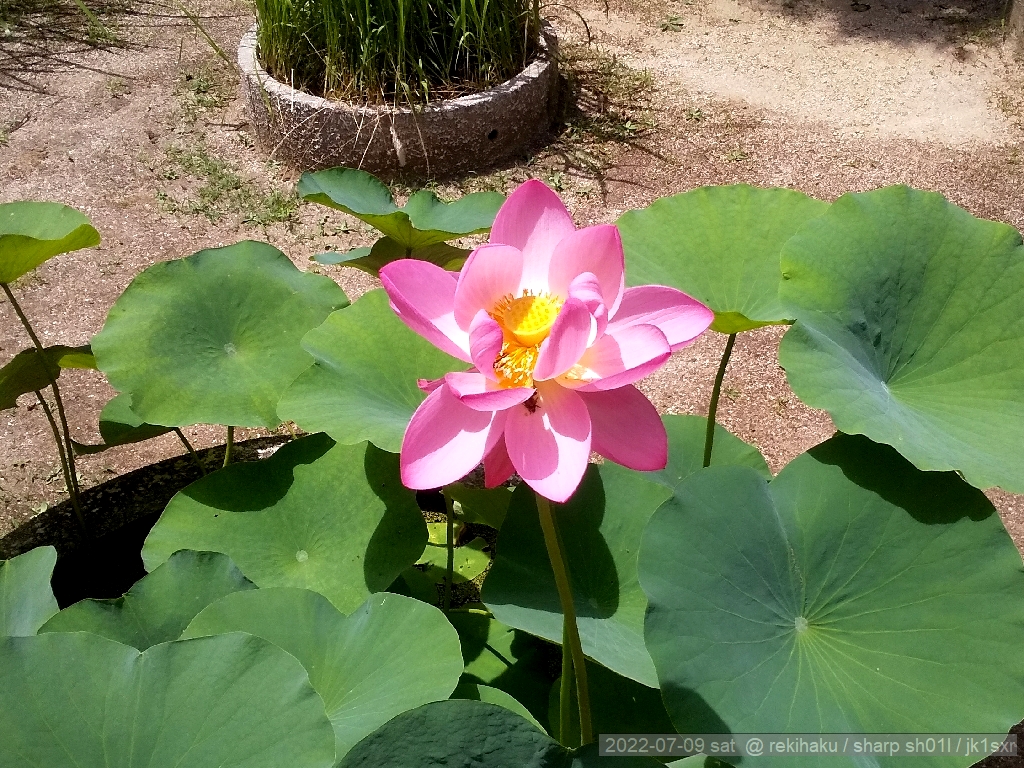 A lotus started blooming at the botanical garden affliated with the nearby National Museum of History and Folklore.
A lotus started blooming at the botanical garden affliated with the nearby National Museum of History and Folklore.
This is an "Oga lotus" awoke from more than 2,000 years' sleep in the underground at Kemigawa.
A Wiki about the "Oga lotus" in Japanese is < here >.
(A web search by the word "Oga lotus" shows some English information.)
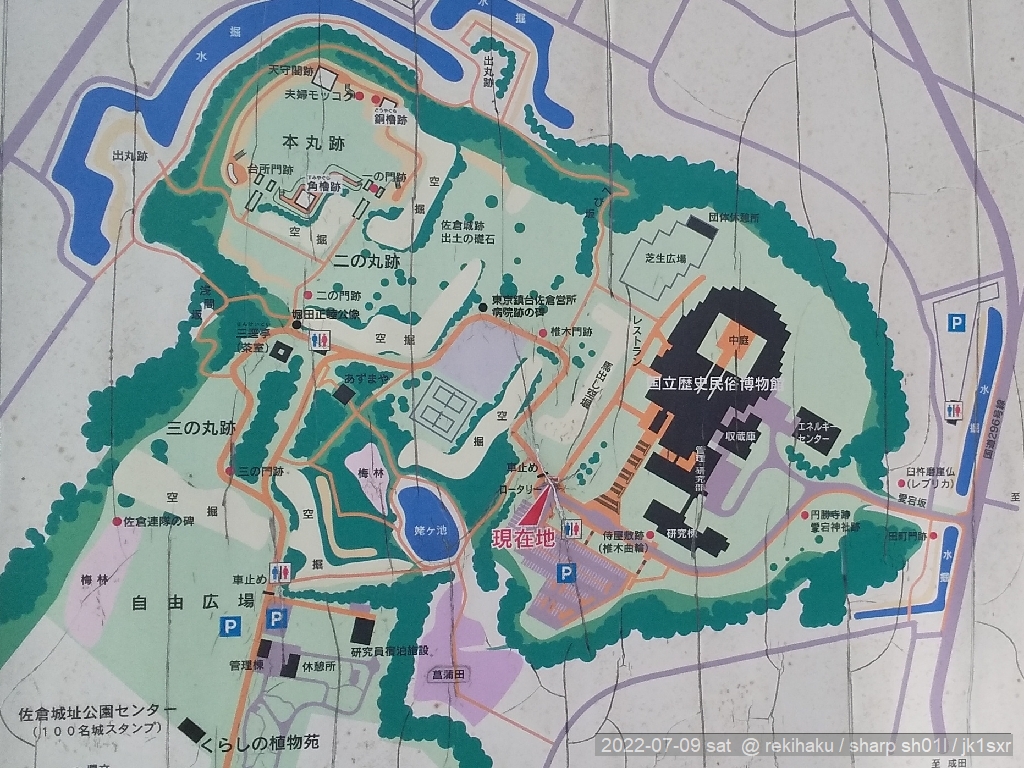
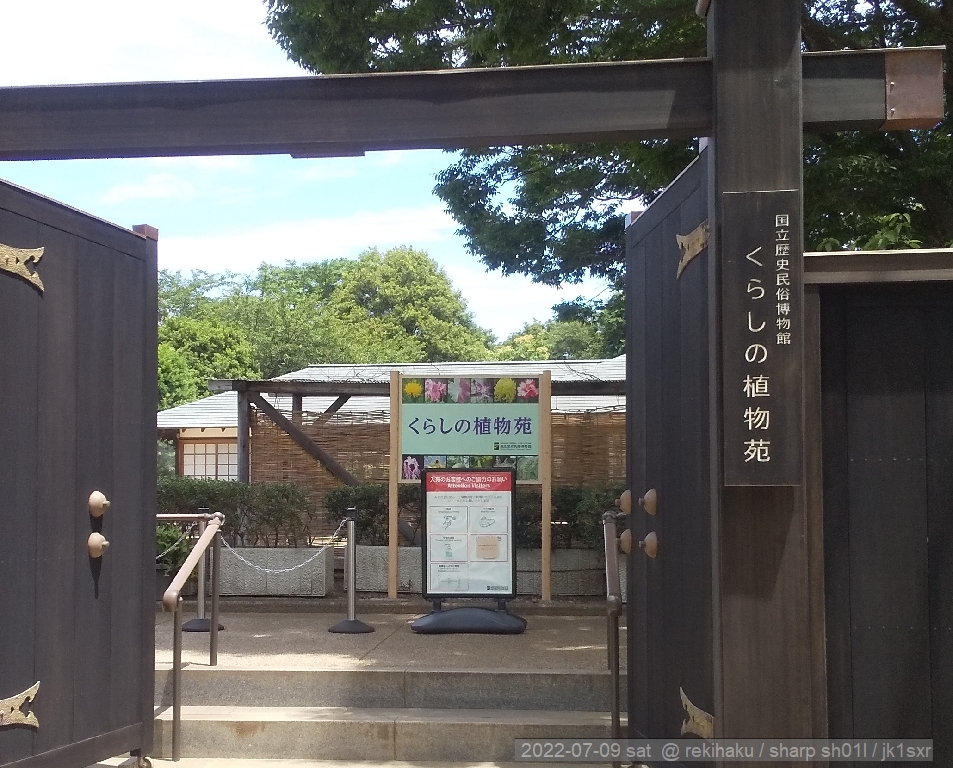
This botanical garden is a bit far from the Museum.
The location is at the left bottom of this map.
The right photo shows its entrance.
604. A utiwa-yanma
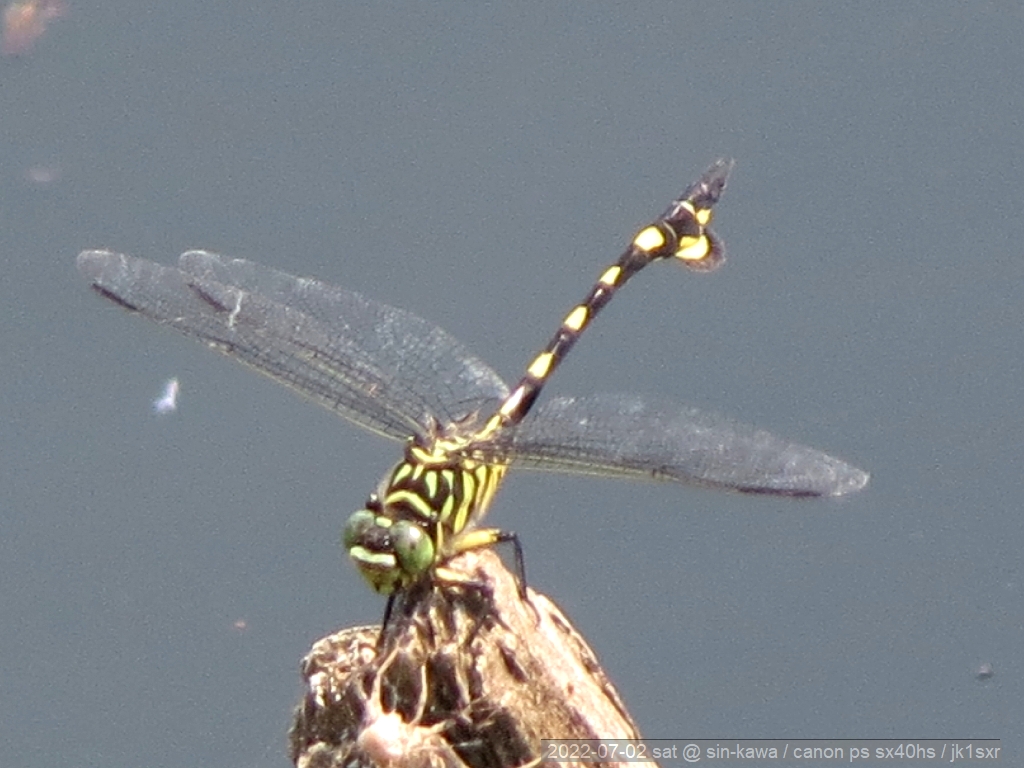 A utiwa-yanma I saw after a while. At the Sin-river close to "Yatiyo" road station.
A utiwa-yanma I saw after a while. At the Sin-river close to "Yatiyo" road station.
Although it has the name of "yanma", in reality it belongs to the "sanae-tonbo" family and not to the "yanma" family.
Looks like it got the name simply because its size is relatively large.
The characteristics of the "yanma" family are said to be;
the right and left compound eyes touch each other at its head, and they make a long-duration flight.
While those of "sanae-tonbo" family are opposite;
the compound eyes are separate, and they like to perch on a pole top for the most time, rather than making long flight.
That is why the utiwa-yanma is photo-friendly.
603.@An error of +10%
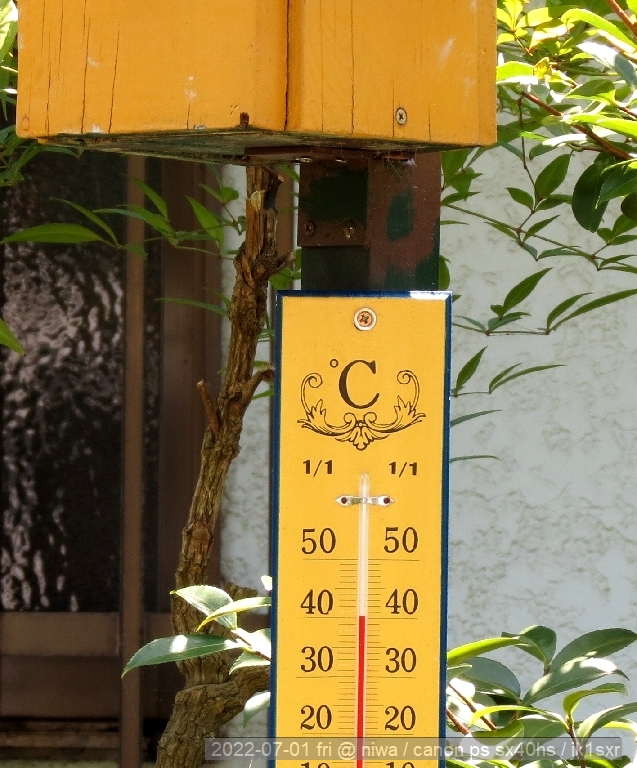 A thermometer at my place at 13:00 today.
A thermometer at my place at 13:00 today.
Exceeding 40 deg C. A bit too high.
As in the photo, it is entirely exposed and not inside the instrument shelter we see (saw) at schools (looks such shelter is not officially used today).
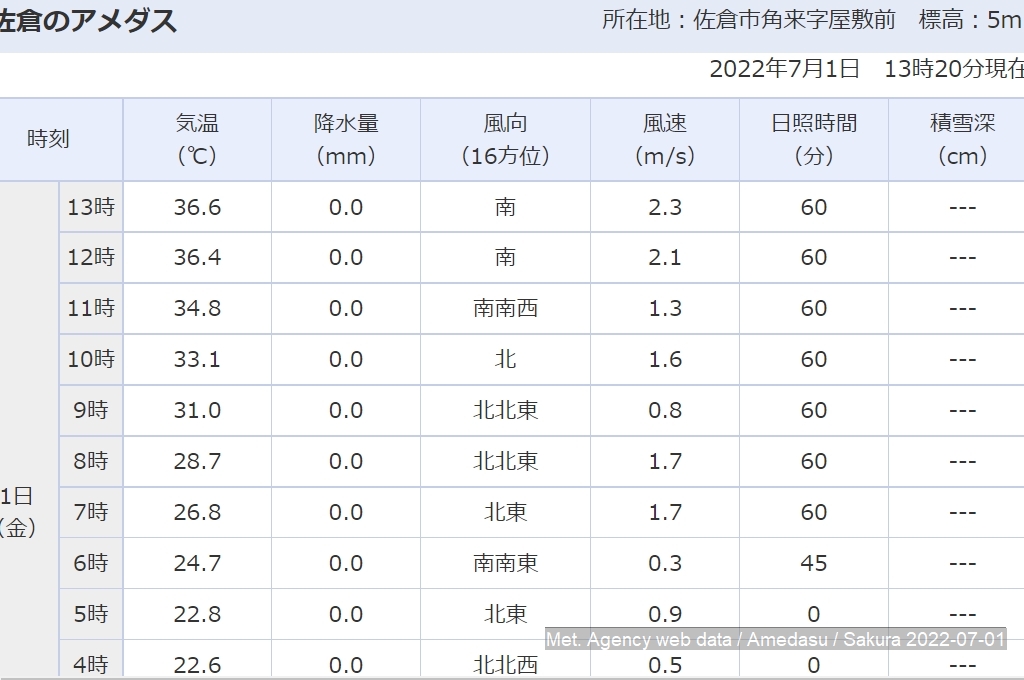 Thus, I checked the nearby Amedasu#.
Thus, I checked the nearby Amedasu#.
The site is 5.0 km due east and close to 20m-high slope bottom, sufficient to raise question whether it is the right place for official measurements.
Anyway, its temperature of the same time 13:00 is 36.6 deg C.
Thus the difference between the two is 3.5 deg C.
Amedasu#:
AMeDASFAutomated Meteorological Data Acquisition System
602. Clear, Wind S-S-W, Wind scale 5
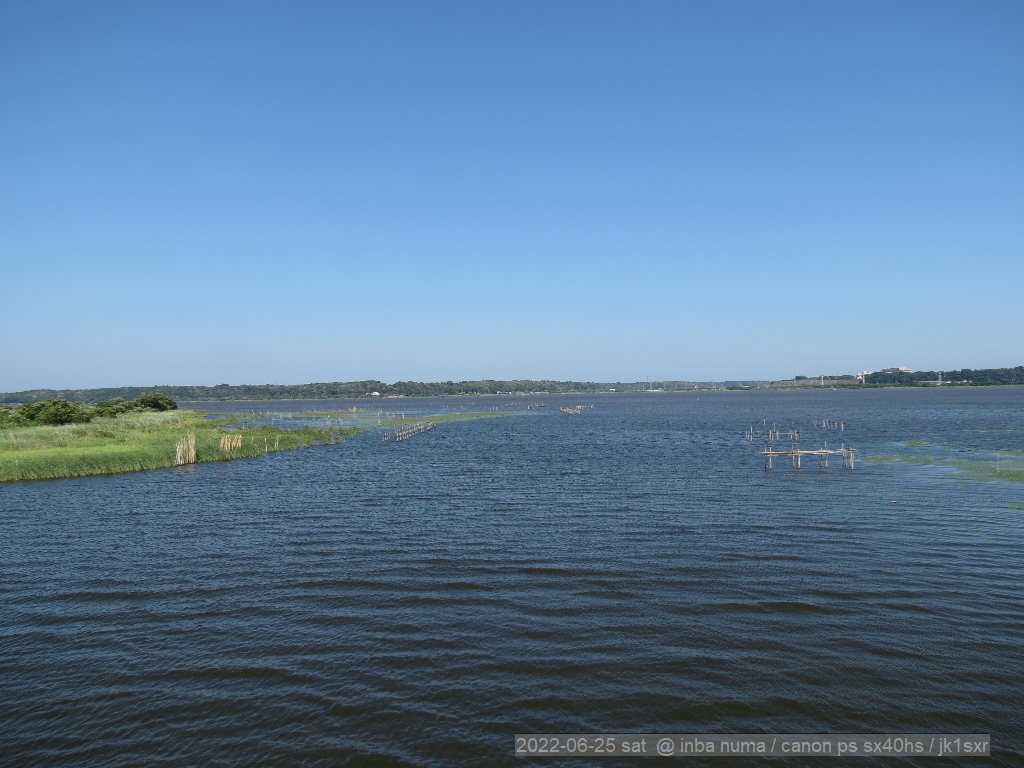
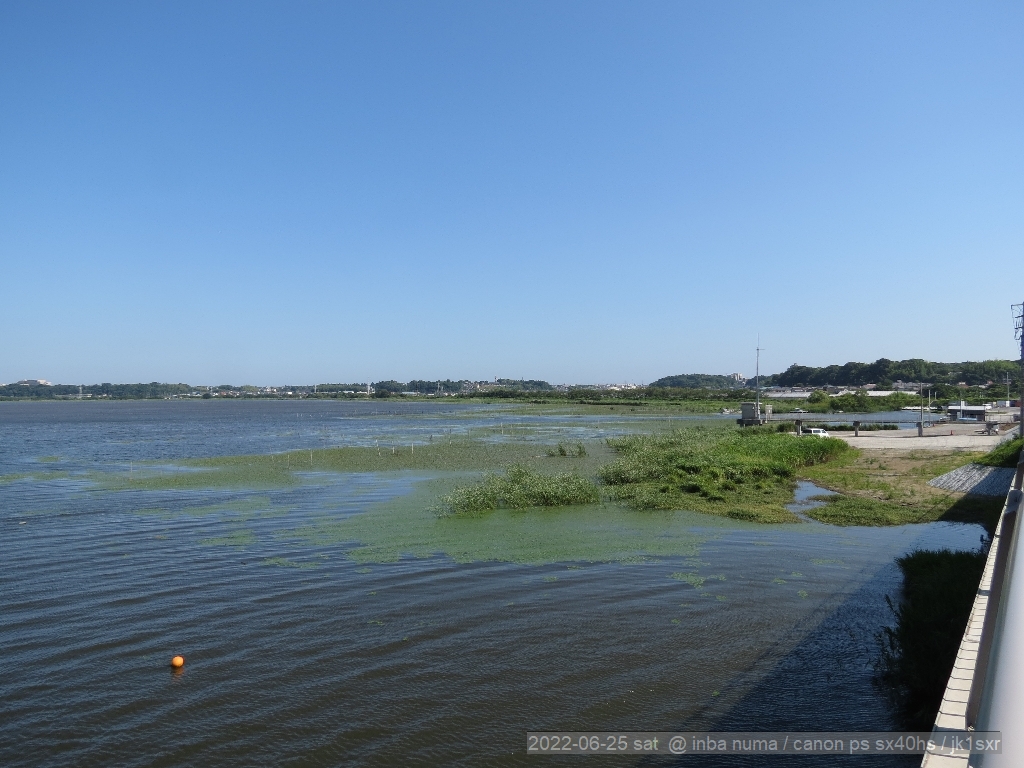
Inba marsh today.
From Funato bridge.
601. A landslide prevention wall
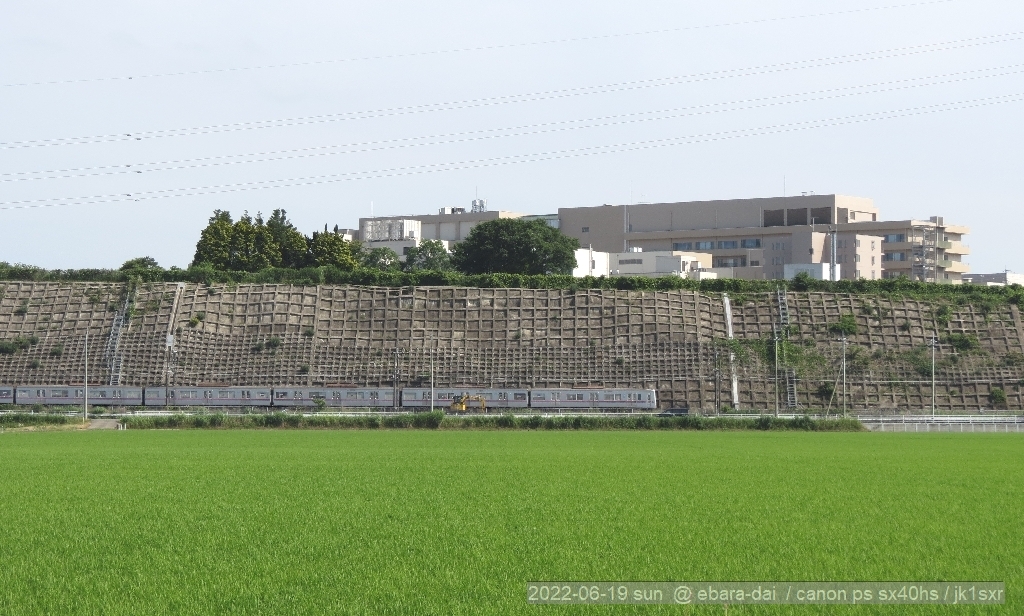
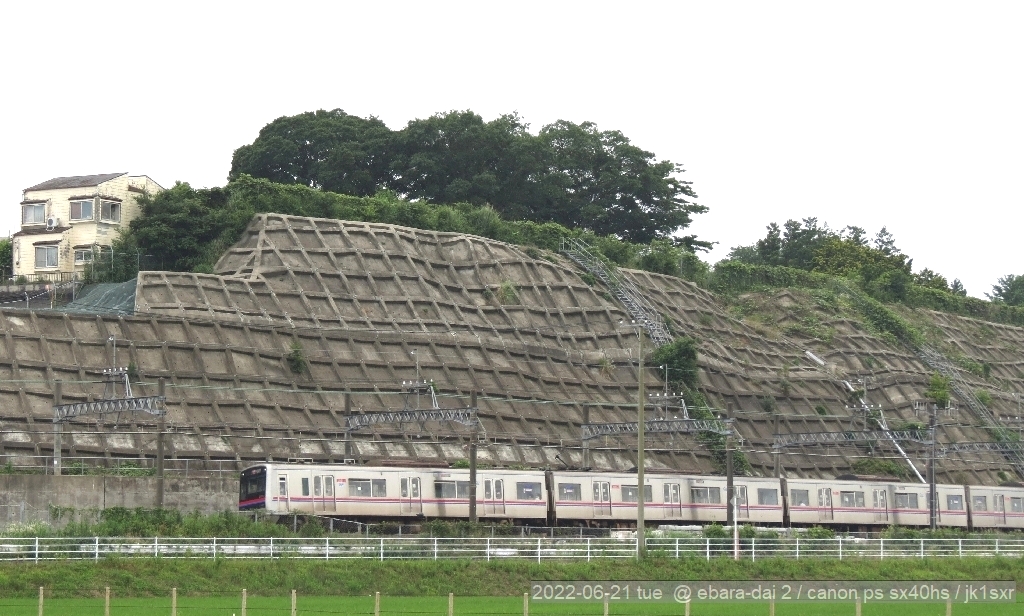
A cliff at the edge of upland of a nearby town.
The site was once in the news when a kid (goat) migrated into this slope.
The upland elevation is 24.5 m and the railway level 5.0 m.
Nearby towns are all situated on similar tablelands.
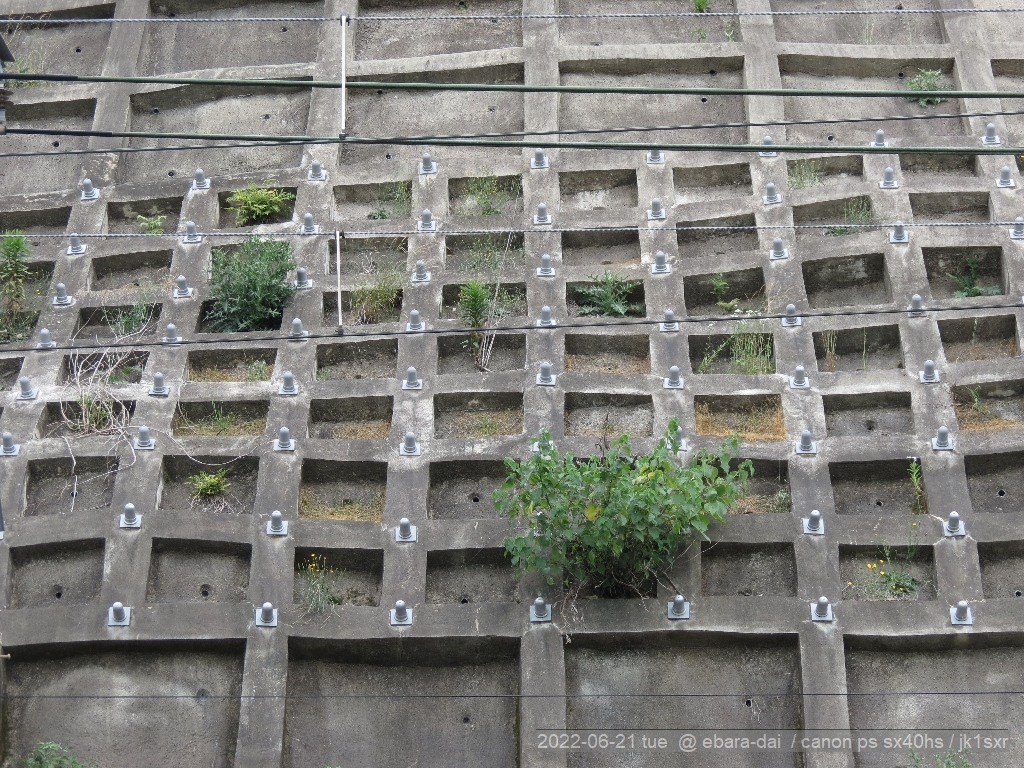 The photo shows the middle section of the landslip prevention wall.
The photo shows the middle section of the landslip prevention wall.
The mechanism looks that long bolts are embedded into the slope so that they work to hold the surface from the inside.
600. Ai-gamo
 Aigamo just arrived at a nearby paddy field.
Aigamo just arrived at a nearby paddy field.
They are supposed to work until late autumn.
609. A kamakiri
 When I work at my yard, this babe frequently appears. Looks it comes to closer, when it senses something moving.
When I work at my yard, this babe frequently appears. Looks it comes to closer, when it senses something moving.Its length was about 1 cm a month ago. Now, 3 cm. Hope it continues to reside here until autumn.
608. Inborn stealth
 Happened to encounter a nii-nii zemi just emerged from the larva. At a nearby square.
Happened to encounter a nii-nii zemi just emerged from the larva. At a nearby square.Used a hand light for this shot, as a close range flash could be a harm to its eyes.
As always, it devotes itself to the stealth coloring.
Looks the rain period has returned again. As usual, it will not end untill 1 or 2 weeks after hearing the chirps of this insect.
607. "Patman X" #
 An article of today's Yomiuri News local page about electric bicycles.
An article of today's Yomiuri News local page about electric bicycles.Reporting the sales of imported bicycles adjusted to local regulations.
This tire design, small diameter and wide width. Looks familiar?!
Yes, "Patman X"'s bicycle, made to resemble a motorcycle.
Well, those who know this are now all in the elderly category?
My experience of a mountain-bike for a daily use has indicated that the tires of small diameter and wide width bring about the light start and flexibiltiy to road bumps, and indeed go well with city riding.
"Patman X" #: A manga series by George Akiyama
606. Nii-nii
 This year's tuyu rain period ended without hearing the chirp of nii-nii zemi.
This year's tuyu rain period ended without hearing the chirp of nii-nii zemi.The photo shows its shell I saw this morning at a nearby square.
As the larva shell is mud-caked and the adult's hue is too subdued, this is a rare not-photogenic specimen among insects.
605. An ancient lotus
 A lotus started blooming at the botanical garden affliated with the nearby National Museum of History and Folklore.
A lotus started blooming at the botanical garden affliated with the nearby National Museum of History and Folklore.This is an "Oga lotus" awoke from more than 2,000 years' sleep in the underground at Kemigawa.
A Wiki about the "Oga lotus" in Japanese is < here >.
(A web search by the word "Oga lotus" shows some English information.)


This botanical garden is a bit far from the Museum.
The location is at the left bottom of this map.
The right photo shows its entrance.
604. A utiwa-yanma
 A utiwa-yanma I saw after a while. At the Sin-river close to "Yatiyo" road station.
A utiwa-yanma I saw after a while. At the Sin-river close to "Yatiyo" road station.Although it has the name of "yanma", in reality it belongs to the "sanae-tonbo" family and not to the "yanma" family.
Looks like it got the name simply because its size is relatively large.
The characteristics of the "yanma" family are said to be;
the right and left compound eyes touch each other at its head, and they make a long-duration flight.
While those of "sanae-tonbo" family are opposite;
the compound eyes are separate, and they like to perch on a pole top for the most time, rather than making long flight.
That is why the utiwa-yanma is photo-friendly.
603.@An error of +10%
 A thermometer at my place at 13:00 today.
A thermometer at my place at 13:00 today.Exceeding 40 deg C. A bit too high.
As in the photo, it is entirely exposed and not inside the instrument shelter we see (saw) at schools (looks such shelter is not officially used today).
 Thus, I checked the nearby Amedasu#.
Thus, I checked the nearby Amedasu#.The site is 5.0 km due east and close to 20m-high slope bottom, sufficient to raise question whether it is the right place for official measurements.
Anyway, its temperature of the same time 13:00 is 36.6 deg C.
Thus the difference between the two is 3.5 deg C.
Amedasu#:
AMeDASFAutomated Meteorological Data Acquisition System
602. Clear, Wind S-S-W, Wind scale 5


Inba marsh today.
From Funato bridge.
601. A landslide prevention wall


A cliff at the edge of upland of a nearby town.
The site was once in the news when a kid (goat) migrated into this slope.
The upland elevation is 24.5 m and the railway level 5.0 m.
Nearby towns are all situated on similar tablelands.
 The photo shows the middle section of the landslip prevention wall.
The photo shows the middle section of the landslip prevention wall.The mechanism looks that long bolts are embedded into the slope so that they work to hold the surface from the inside.
600. Ai-gamo
 Aigamo just arrived at a nearby paddy field.
Aigamo just arrived at a nearby paddy field.They are supposed to work until late autumn.
Copyright © 2013 JK1SXR/m.abe. All Rights subject to common sense.